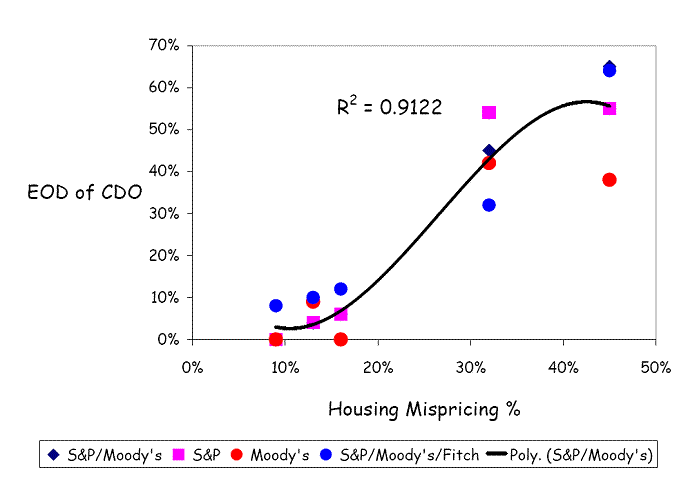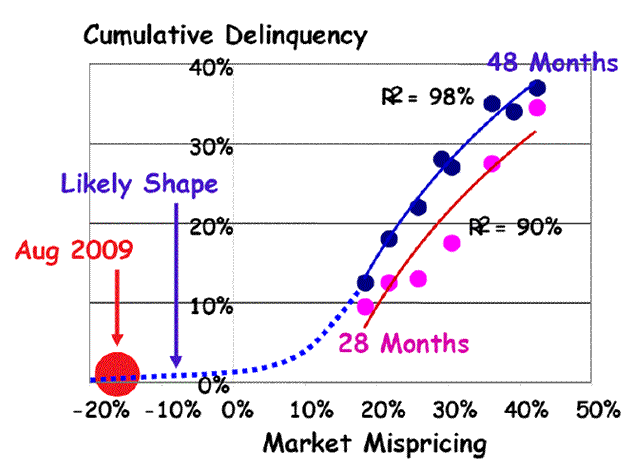The Dummies Guide To Valuing A CDO: Reference Barnett-Hart’s Thesis
Interest-Rates / Credit Crisis 2010 Mar 20, 2010 - 03:01 PM GMTBy: Andrew_Butter
 The “News” over the past eighteen months, is that the people who said that they knew how to do a rating on a CDO (Collateralized Debt Obligation), now say they don’t know how to do that.
The “News” over the past eighteen months, is that the people who said that they knew how to do a rating on a CDO (Collateralized Debt Obligation), now say they don’t know how to do that.
And the people who said they knew how to value a CDO, or a RMBS (Residential Mortgaged Backed Security), now say they can’t do that either.
And The Reason Why? Well they realised that in fact they never knew how to do it in the first place, which is why they managed to lose “X” trillion for their employers or customers, which fortunately (for them) the American Taxpayer has agreed to pay back, on account of the fact that people who are completely clueless are essential for the proper functioning of the US economy.
That’s nice.
Although, on reflection, I’m quite glad I don’t pat US taxes.
I was reading A.K. Barnett-Hart’s now famous undergraduate thesis “The Story of the CDO Market Meltdown: An Empirical Analysis”. It’s impressive, it’s also a very well written and easy-to-read account of what happened; you can find a link to it here:
http://blogs.wsj.com/deals/2010/03/15/michael-lewiss-the-big-short-read-the-harvard-thesis-instead/
One of her conclusions, based on doing multivariate regression analysis was that the best predictor of a CDO default; is the year it was written, like if it used mortgages written in 2006 and 2007. I’m not sure if I understood her table right but it looked like she got a 35% R-Squared on that.
Pity she didn’t put in the extent of mispricing of the housing market as a variable (housing was the fundamental asset that collateralized most of those instruments).
For example – here is a plot of data that I eyeballed from one of her charts (Fig 11), plotted against the extent of market mispricing that I calculated in September 2008:
http://www.marketoracle.co.uk/Article6250.html

What that says is essentially confirming what Barnett-Hart was saying, i.e. that when the junk going into the CDO was 2006 or 2007 vintage, well, they blew up; but what that adds is putting a number to it, and identifying the key driver.
The straight line R-Squared is 88% for twenty points of data (love to have the actual but there you go), I suspect though the best-fit is an “S” curve which has a 92% R-Squared.
That’s a pretty similar result to the analysis that I did a while ago:
http://www.marketoracle.co.uk/Article12918.html
That was looking at an analysis that I did of a study done by a team from Columbia University led by Dr. Wei Jiang which as far as I have seen represents the most coherent study of the mortgage market in USA (not as famous as Ms. Barnett-Hart but then she writes really nice, and dare I say it, she is a LOT prettier).

So two pieces of evidence that basically the level of toxicity is a function of how badly the geniuses misread the market mispricing, basically if the LTV you use is about right, then OK, defaults are low, like about zero.
You are a genius – collect $6 billion in fees.
BUT if the value you use for the “L” in the LTV is wrong – like by about 40% too high (I’m talking about reference “Other than Market Value here, not “What you might have sold the asset to some dumb bastard to yesterday” (M-2-M)), then the chances of a default are well pretty much linear in line with the mispricing.
Except there is an “S-Curve” – which is normal in nature.
I used to work on a toxic-asset-assembly line, my job was to work out “V” , and I’m proud to say that every “V’ that I worked out was the “V” in ten years time (that I said it would be).
Pretty boring stuff, but if you have money and you want to make you “V” go up, it’s a good idea to know what “V” really is today (outside of the “V” you can get from selling something to someone dumber than you).
Insofar as either rating or valuing a CDO (or any other sort of toxic asset is concerned), what this analysis shows is that 90% of that is about the “V”.
Work out the “V” and well, let the remaining 10% just take care of itself.
By Andrew Butter
Twenty years doing market analysis and valuations for investors in the Middle East, USA, and Europe; currently writing a book about BubbleOmics. Andrew Butter is managing partner of ABMC, an investment advisory firm, based in Dubai ( hbutter@eim.ae ), that he setup in 1999, and is has been involved advising on large scale real estate investments, mainly in Dubai.
© 2010 Copyright Andrew Butter- All Rights Reserved
Disclaimer: The above is a matter of opinion provided for general information purposes only and is not intended as investment advice. Information and analysis above are derived from sources and utilising methods believed to be reliable, but we cannot accept responsibility for any losses you may incur as a result of this analysis. Individuals should consult with their personal financial advisors.
Andrew Butter Archive |
© 2005-2022 http://www.MarketOracle.co.uk - The Market Oracle is a FREE Daily Financial Markets Analysis & Forecasting online publication.



